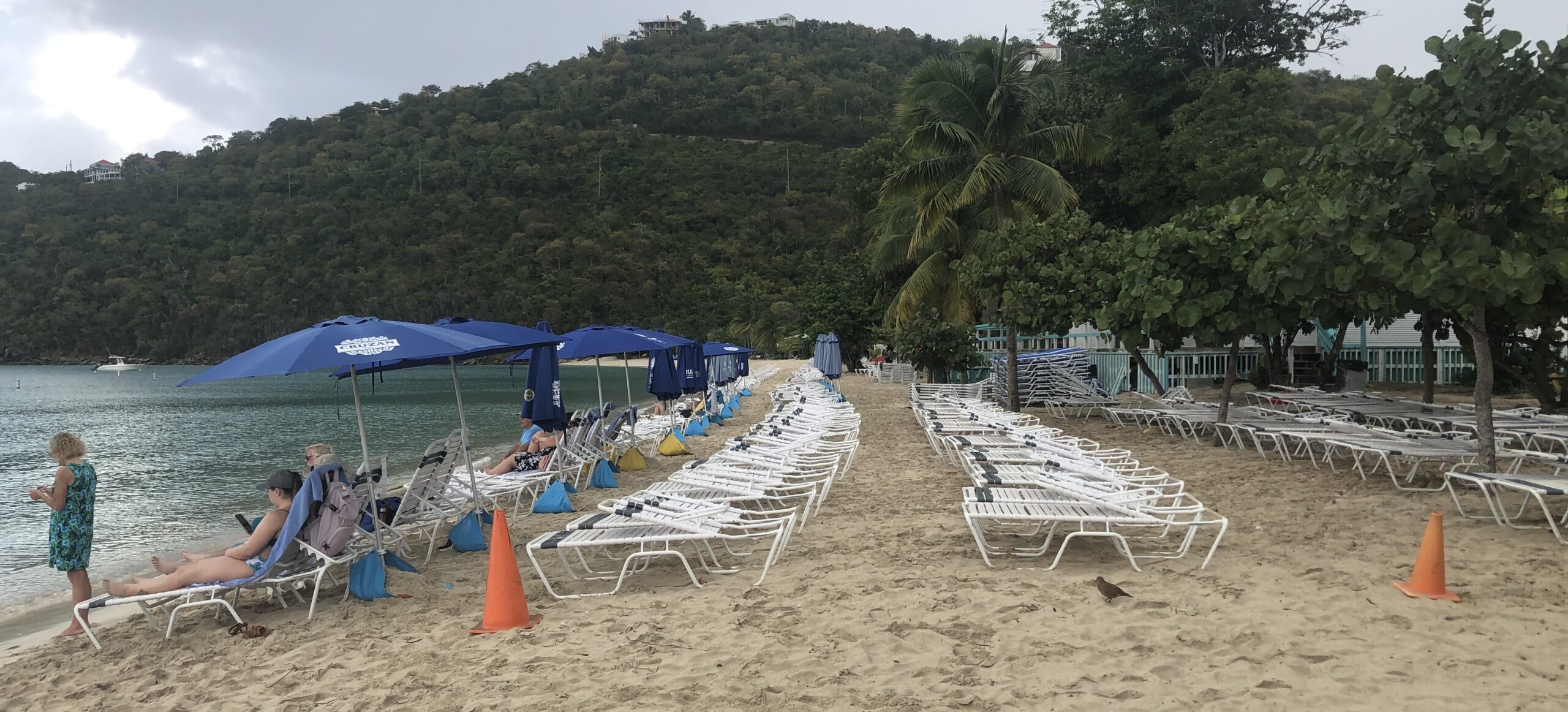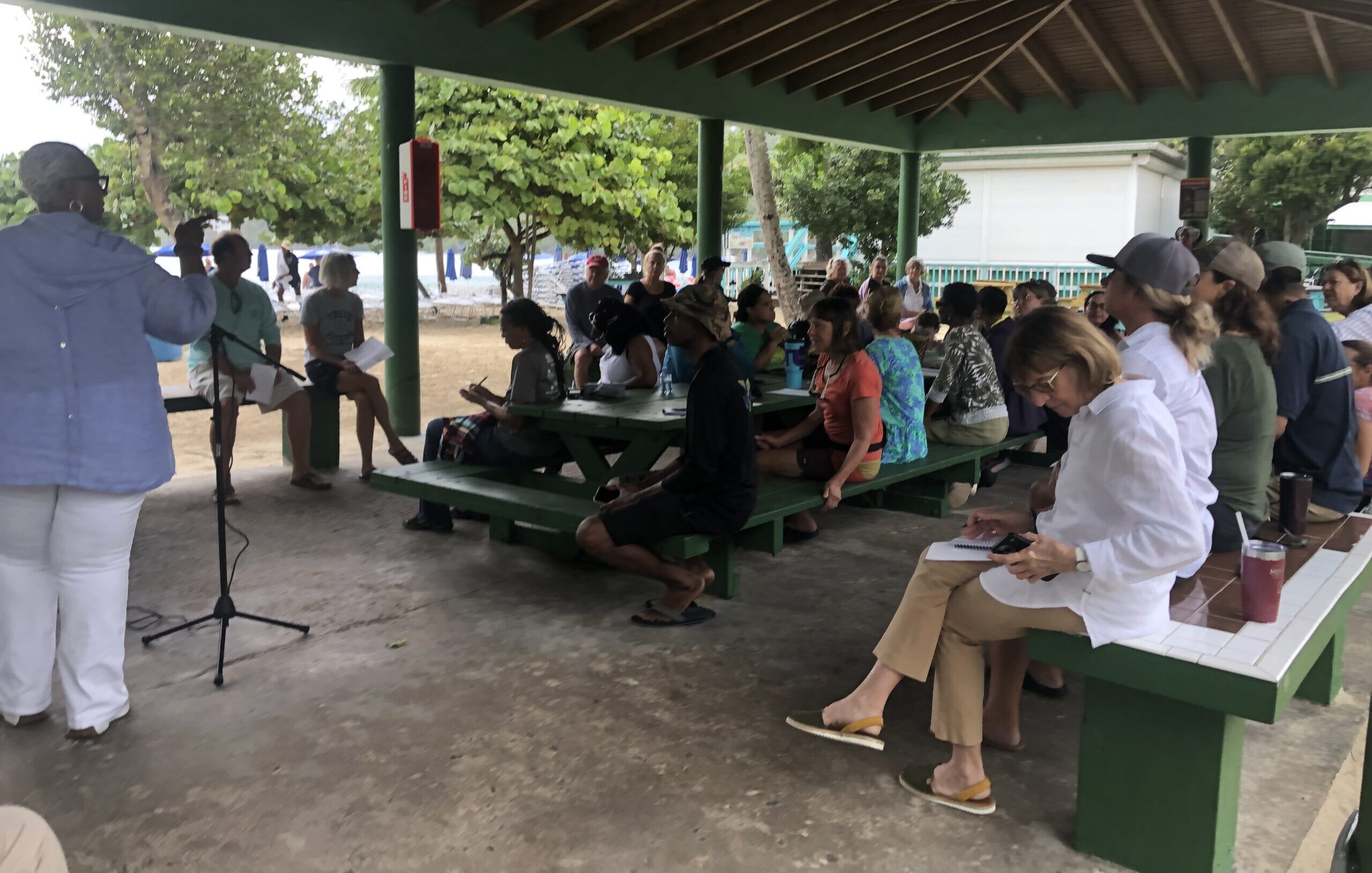
Moorings, lounge chair rentals and planned future developments were among the topics Saturday at the first town hall meeting of the Magens Bay Authority since the COVID-19 pandemic interrupted the gatherings. More than 40 people crowded under Shed 2 on a rainy, windy morning to ask questions and voice their concerns about practices they fear are geared more to attracting tourists than serving Virgin Islanders.
As if to drive home that point, just feet from the shed five rows of mostly empty lounge chairs stretched along the beach to the end of the concession building, awaiting the day’s cruise ship passengers.
“We need to remember that Magens Bay is for the people of the Virgin Islands,” said Dalma Simon, taking in the scene.
Barbara Petersen, chair of the Magens Bay Authority board, said the sustainability of the park relies on both locals and tourists, and they also must consider the feedback and concerns of the cruise ship companies. The setup is intended to save tourists time, so they’re not spending half of their two-hour excursion situating chairs, she said.
Interim General Manager MemorieAnne Brown-Callender added that the rentals are open to all, and that there are no restrictions as to where anyone can place their own chair on the beach. Simon responded that there would be “hell to pay” if anyone tried to prevent him from doing so.
“How far down the beach do you intend to allow these lounge chairs to go?” asked former Sen. Ruby Simmonds Esannason, who was told that the rentals are restricted to the area in front of and just to the west of the concession, where chairs were stacked 10 or so high near a tree marking the limit of the boundary. Additionally, the chairs are removed each evening and set back up between 6 and 6:30 a.m. the next day, Brown-Callender said.

With a massive yacht floating among other smaller boats in the bay on Saturday, board members were also peppered with questions about the park’s mooring and anchoring policies.
“This is insulting to the people of the Virgin Islands, those big yachts out there,” said Simmonds Esannason, who recalled that traditionally, only generational fishers could moor or anchor in the bay. “This is a disgrace,” she said, nodding to the massive vessel anchored on the horizon.
Gene Brin Jr., who described himself as a “dying breed of fisherman,” said he has had issues with charter boats using his mooring, and at times damaging it, and wondered who is monitoring them. Others chimed in, voicing concerns about a repeat of the scene during COVID-19, when a record number of boaters flocked to the Virgin Islands, including Magens Bay, to ride out the pandemic in tropical splendor.
Debra Brown DeLone, a fourth-generation Virgin Islander who in retirement lives on the mainland but returns each January for a month, was a senior planner with the Division of Conservation and Cultural Affairs who in 1983 wrote the territory mooring plan that was passed by the Legislature in 1989 after numerous community meetings to gather input from traditional fishers, local boaters and charter operators.
When the legislation came before the Senate, the place “was filled with boaters and community-interested people. It was a banner day, because what that plan was stating was that the bays of St. Thomas, St. Croix and St. John would never be used for mooring, given the detriment to the bays, to the population, to the inability of DPNR’s enforcement team to manage those moorings in the bays,” said DeLone.
“I am saddened — saddened — every morning when I take my walk on Magens Bay and watch huge yachts — that one sitting there seven days — berthed or docked here in Magens Bay, and I really wonder if they are going out to dump, because when I come down the next morning, they are in the same spot they were the morning before,” she said.
Simmonds Esannason said the one concession legislators approved when she was a senator was that generational fishers could moor in the bay. “That was the only thing that we wanted on Magens Bay beach. The only kind of vessel would be those traditional fishing boats,” on the east corner of the beach, she said.
“There was never any consensus in the Legislature when I was there — I served two terms — that we would have this kind of insult to the people of these islands, having these big yachts sitting out here. We don’t know what they’re dumping, we don’t know what they are doing. I have been coming to this beach all of my life and I’m 75 years old. This is a disgrace. I want to find a way that we can rescind whatever law, whatever regulations, allow for anything to be moored in Magens Bay,” said Simmonds Esannason.
Brin also questioned who is allowed to use the channel entrance that DPNR recently marked — at first through the fishers’ mooring field, though that mistake has since been corrected after he alerted the Magens Bay Authority.
“As a dying breed of fisherman, it seems like more of the charter influence is coming in and they have bigger boats, four-engine boats, and they run in and out with lots of people drinking and carrying on. Are we just going to let small dinghies or yachts come into the bay?” Brin asked.
Security will keep a watch for any violations by boats picking up or dropping off passengers, or speeding through the channel, but board member Dayle Barry pointed out that the authority has jurisdiction only from the mean high tide line landward, and DPNR oversees submerged lands. The department was invited to send a representative to the meeting, but he received notice Saturday morning that nobody was available, said Barry.
Under current regulations, vessels may anchor in any given bay for 14 days in a six-month period, but the authority has submitted a proposal to DPNR and the Virgin Islands Professional Charter Association — which is installing 200 new Helix-type moorings in bays throughout the territory in a private-public partnership with the V.I. government — to limit that to three days in Magens Bay, said Barry. There is also talk of deputizing staff to be able to enforce the regulations, he added.
Under the VIPCA plan, Magens Bay will have a total of 12 moorings for both day and transient use, said Barry. They may be reserved online through DPNR, when park fees will also be collected, including for solid waste disposal at a cost of $5 per small bag of trash and $10 per large bag, to prevent mariners from sneaking ashore at night to dump their garbage in the authority’s waste bins, he said.
“In partnering with us they asked us for input and we provided some guidance with regard to what we would like to see. If you look out at the bay right now you can see there are boats that have dropped anchor, and that is one of the concerns we have in the bay. Boats sometimes drop anchor in inappropriate areas and disturb the bottom communities. So we approved the proposal with some conditions. One of those conditions is in regard to the length of time that transient moorings can be used,” said Barry.
“What we did is limit the use to three days because that is the capacity of a holding tank. We want to ensure that for the time frame that someone is in Magens Bay that they have the capacity to hold their sewage and then depart from Magens Bay before it’s time to get rid of that sewage. We have, I think it was 13 days if I remember correctly, that it takes for the bay to flush out. The study was done by the Department of Planning and Natural Resources. We don’t want to have sewage floating around in Magens Bay for a 13-day period before it finally moves out,” said Barry.
“That proposal has been approved tentatively,” he said, and will be finalized before the moorings are installed.
In other news:
— The board announced that it voted Wednesday to put an offer on land that the Nature Conservancy is selling, and that according to the deed, it may not be developed commercially.
— Brown-Callender outlined the rules for shed rentals — no confetti, balloons, plastic streamers, glass containers or generators — which are available to reserve online. Additionally, events must have prior approval by the board, which meets at 10 a.m. on the third Friday of most months at Shed 4. Email info@magensbayauthority.org and operations@magensbayauthority.org.
— The restaurant is open from 10 a.m. to 4 p.m. and the bar from 10 a.m. to 5 p.m. under new concessionaire Elevated Hospitality LLC, with a major renovation planned in September and October to replacing aging equipment and infrastructure, after which it will consider resuming breakfast service.
— Working plans have been OK’d for the reconstruction of Bathhouse 1, which was rendered inoperable by Hurricane Irma, after a lengthy approval process that included the Federal Emergency Management Agency, which is funding 90 percent of the project, the State Historic Preservation Office and Coastal Zone Management Committee. A request for proposal for the project is under review and then will go out to bid.
— As part of the approval process for the bathhouse, the Magens Bay Authority has developed a master plan that includes, far in the future, a new concession building that will be located west of the current structure, so it does not impede the view as visitors enter the park.
— Other capital projects include a new Americans with Disabilities Act-compliant ramp at Bathhouse 3, repaving the road to the right of the entrance, electrical system upgrades, a new generator to power the sheds and other infrastructure during electrical outages, and, down the road, the purchase of a rescue boat.
— Construction of a passive exercise trail — from the bridge to Shed 4 — in memory of late board member and former V.I. Solicitor General Elliott “Mac” Davis. A contractor has been selected and the contract is being finalized by the legal department.
— Consideration of a no smoking policy. Currently, smoking is prohibited from the tree line to the water, but the majority at Saturday’s town hall seemed to support a total ban on lighting up within the park.
— Everybody, even indigenous Virgin Islanders, must pay the entrance fee, which covers services such as the bathhouses, lifeguards, maintenance and security, but park staff are instructed not to argue if someone refuses to pay, said Petersen. She also noted that yearly passes include one month free.
— Many attendees complained about the amount of garbage they find on the beach at the end of the day and suggested that tour operators and taxi drivers could help remind visitors to leave no trace behind. They also praised park staff, who they said are courteous, hard-working and responsive when they raise issues of concern.





